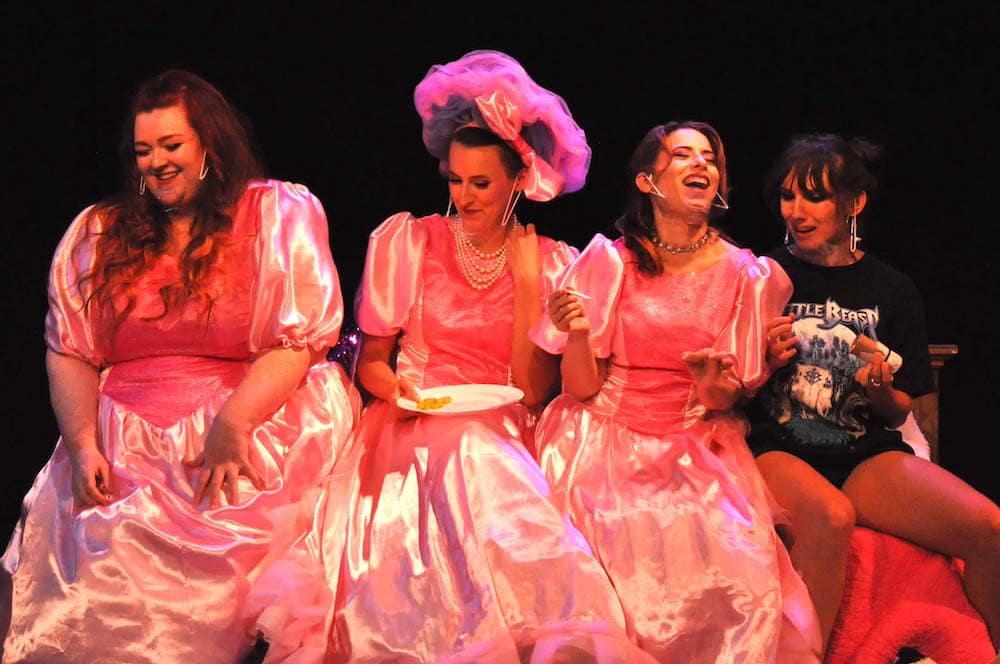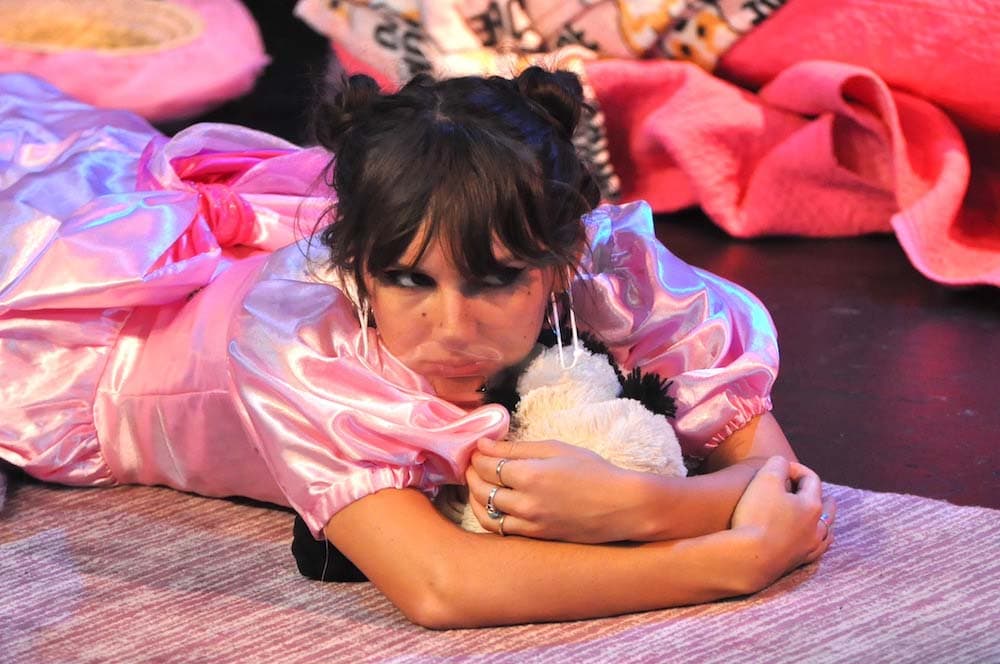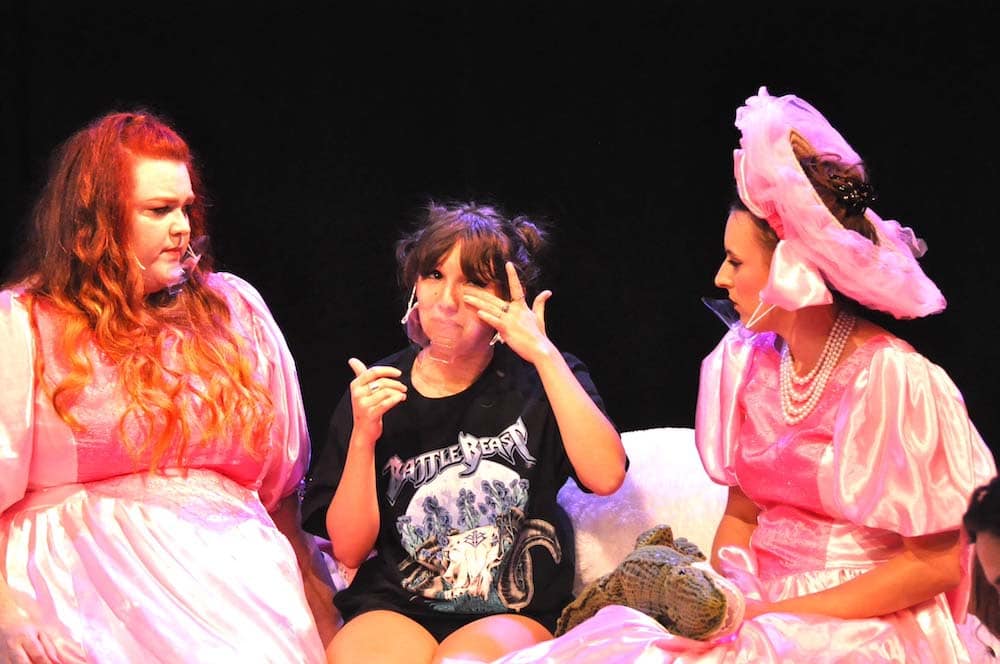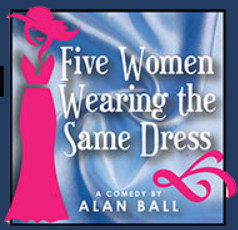It is not often that women theater artists get to air publicly their critiques of a script they worked on. It is rarer still to do so while the show is running. But wait till you read the pair of opinion pieces below. The director and a cast member of Alan Ball’s comedy Five Women Wearing the Same Dress—now playing at Dominion Stage through November 20, 2021—give it a clap back you’ll have to see the show to believe. —Eds.

A Feminist Play? by Danielle Guy, director
I don’t believe all men are trash. But I am 100% clear that all patriarchy is trash. All oppressive structures and mindsets, they are a smog — we all breathe patriarchy in. Which means that men will perform patriarchy even when they aren’t trying. And folks accept it. It also means that women will operate with patriarchal mindsets and internalized sexism, and not realize what we’re doing.
—Brittany Packnett Cunningham, Activist
With a title like Five Women Wearing the Same Dress, it would be remarkably easy to tout this as a feminist play. Why wouldn’t it be? There are five women in it! It is undeniable that the majority of plays are male-centric in both casting and plot. It’s for this reason that the Bechdel-Wallace test was created. How could a play centered around women not be a feminist piece?
The Bechdel-Wallace test has three very easy criteria. (1) There must be at least two named women, (2) who speak to each other, (3) about something other than a man. It is the third criterion in which countless plays fall short, including this one. And while it is impossible to expect every single play or movie to adhere to these rules, I would venture to say it’s not too much to expect from a play that describes itself as a “celebration of women’s spirit.”
Underneath the layers of irreverent dialogue, ridiculous costuming, and outrageous antics, we are left with a play that entirely revolves around the male presence in these women’s lives. While any discussion of education, children, jobs, and personality gets brushed over as exposition, the attraction to, disgust about, and desire for men drives the plot.
So what were we as a cast and crew of predominantly women to do? The idea that a man would write a play about the intricacies of female relationships was at its most innocent, naive; at its worst, nothing short of audacious. How were we to portray a piece that at its core does not accurately portray women and their relationships?
What you will see in our production at Dominion Stage is an expression of the frustrations that I and the cast had with a play that did not lend itself to three-dimensional female representation. The characters may be placed in a box of hyper-femininity and patriarchal stereotypes of women, but that does not mean that the performers have to be as well. As artists, we have the obligation to break out, and in turn invite our audience to do so as well.
I do believe that when Five Women Wearing the Same Dress was written, it was with the best of intentions. We happily acknowledge that this play provides an unfortunately rare opportunity for female performers to be front and center for its entirety. But most importantly, I hope that this production allows you to take a moment to identify some of the misconceptions and blindspots regarding women in the arts, to ensure a more equal future.

Embodying the Unlikeable by Gwyneth Sholar, actor
I’m going to spoil something for you. Meredith Marlowe—the character I play—is terrible. You’ll get to know her better when you come to see Five Women Wearing the Same Dress, but let me be the first to tell you here: Meredith Marlowe is the most genuinely exasperating person I’ve ever had to portray onstage. For the sake of not revealing too much, I’ll just tell you that she is entitled and ignorant at best. At worst, she is homophobic, obliviously racist, and content to run around lamenting her own privilege. Speaking objectively, she sucks. So you can imagine my dread when I finished my first full read-through of the script.
Frankly, I hated her. But I had a bigger problem, crucial to my role as an actor in this play. I was baffled as to what I was going to do with her. I pondered and pondered for weeks about how the hell I was going to make this character sympathetic. I turned to characters like Phoebe Waller Bridges’ Fleabag in the hope that I could find elements of comedy or strained grief in Meredith’s constantly atrocious behavior. Nothing stuck. Meredith’s dialogue revealed her to be much less clever, and strangely much less mature, than my beloved Fleabag. I couldn’t do it. My efforts to make Meredith likeable were continually thwarted. And if I couldn’t make her likeable for me, the actor, how in the world was I going to make her sympathetic to an audience? Then last week, it hit me: I decided that I wasn’t going to try.
As I journeyed through media’s newly popular chaotic women of sometimes questionable morals, I learned more about who Meredith was not. The Fleabags and Issa Dees were too incisive, too smart, too nuanced. A Regina George or Dory Sief, too manipulative. Ilana Wexler, too ridiculous. I needed a role model more adolescent, more petulant. Someone who couldn’t stand to be criticized. An adult, but also a child. Someone with a true, quotidian lack of awareness of everyone around them.
I can’t lie, once I realized that, a lot more men became involved in my metaphorical vision board for Meredith. I won’t say exactly who, but these men are characterized by childishness, abrasiveness, and a genuine selfishness. Not necessarily of an uppity variety, but an earnest inability to see very far outside of themselves due to a combination of privilege and trauma that to me, seems to lock empathy somewhere so far down in them that it’s extremely, extremely hard to perceive and even more difficult to express. And these characters do not give a hoot, not a single one, how they affect those around them. For me, this was the key to Meredith, and a lesson that resonated with me more than I could have expected.
Like many people, I have a monstrous entity living rent-free in my mind at all times: social anxiety. The way it manifests for me is often in hyper-awareness. One of the biggest things I fixate on is what I’ll call the emotional temperature of the people around me. If there is discomfort, I feel it. If there is resentment, I feel it. If there is exuberance, I feel it. When there’s a positive emotional temperature, this is wonderful, but if I sense any negative temperature I almost always misattribute it to myself. If there is discomfort, it’s my fault. If there is resentment, I’m certain I caused it. And with this great sensory power comes great responsibility! I am responsible for it, so it’s up to me to change it.
The characters that have helped me unlock Meredith don’t feel that burden. And now, because of that, Meredith doesn’t either. She’s much too caught up in herself, her insecurities, her trauma. So yes, Meredith is unlikeable. And like the masculinity on which she is modeled, she is fragile. Even though she is not truly served by her own selfish behavior, she can’t step outside of herself enough to be concerned about anyone around her. It’s the root of everything I despise about her. But in a twisted way, it is the most freeing quality for me to briefly embody, then leave on the stage floor.

Danielle Guy (Director, Set Designer) is happy to return to Dominion Stage. Danielle has directed in various cities through Appalachia and Northern Virginia since 2009. Though her past works have predominantly focused on classical works, she has been enthusiastic to expand to contemporary plays, musicals, and movement-based works. Though directing is her passion, she has also worked as Company Manager with The Contemporary American Theater Festival, Producer of The Black Box Arts Center, and Artistic Director of Inspirata Theatre Company. Additionally, she has worked as a stage combat, dance, and intimacy choreographer, costume designer, dramaturg, script consultant, and stage manager in various productions in the tri-state area. She is eternally grateful to Dominion Stage for the opportunity to work on this show, and for her cast and crew who have dedicated their time, energy, and passion both on and off stage.

Gwyneth Sholar (Meredith) is thrilled to be appearing onstage with Dominion for the first time. Favorite past credits include A Midsummer Night’s Dream (Puck), Hand to God (Jessica), and Cabaret (Sally Bowles), as well as directing a new iteration of Macbeth in 2019.

Running Time: Two hours, including a 15-minute intermission.
Dominion Stage’s COVID-19 Protocols are here.
SEE ALSO:
Plenty of laughs in pinkalicious ‘Five Women Wearing the Same Dress’ Dominion Stage’s ‘Five Women Wearing the Same Dress’ opens Nov. 5





